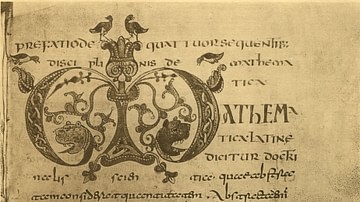Search
Did you mean: Lamia?
Search Results

Definition
Alfred the Great
Alfred the Great (r. 871-899) was the king of Wessex in Britain but came to be known as King of the Anglo-Saxons after his military victories over Viking adversaries and later successful negotiations with them. He is the best-known Anglo-Saxon...

Definition
William Tyndale
William Tyndale (l.c. 1494-1536) was a talented English linguist, scholar and priest who was the first to translate the Bible into English. Tyndale objected to the Catholic Church’s control of scripture in Latin and the prohibition against...

Definition
John Wycliffe
John Wycliffe (l. 1330-1384, also John Wyclif) was an English theologian, priest, and scholar, recognized as a forerunner to the Protestant Reformation in Europe. Wycliffe condemned the practices of the medieval Church, citing many of the...

Definition
Seventh Crusade
The Seventh Crusade (1248-1254 CE) was led by the French king Louis IX (r. 1226-1270 CE) who intended to conquer Egypt and take over Jerusalem, both then controlled by the Muslim Ayyubid Dynasty. Despite the initial success of capturing Damietta...

Definition
Lucius Tarquinius Superbus
Lucius Tarquinius Superbus ('Tarquin the Proud') was traditionally the seventh and last king of ancient Rome before it became a republic. He belonged to the Etruscan Tarquinii clan, reigned from 534 to 510 BCE, and was infamous for his tyrannical...

Definition
The Description of Africa
The Description of Africa is the first comprehensive book about Africa, written by Leo Africanus, an African scholar trained in the Islamic intellectual tradition, in 1526, during the Italian Renaissance. A skillful mixture of anthropology...

Definition
Social War
The Social War (also called the Marsi War or the War of the Allies) of 91-87 BCE was the result of decades of contention between Rome and its Italian allies. Roman warfare relied heavily on the Italian allies (socii), but the Roman Republic...

Definition
Etymologiae
The Etymologiae (Etymologies) is a Latin work by Isidore of Seville (l. c. 560 - 636 CE), compiled in the early 7th century CE and published in its final form shortly after his death. The book is a type of medieval encyclopedia and is a survey...

Article
Fatima Al-Fihri and Al-Qarawiyyin University
Fatima Al-Fihri (c. 800-880) was a Muslim woman, scholar and philanthropist who is credited with founding the world’s oldest, continuously running university during the 9th century: the University of Al-Qarawiyyin, located in Fez in Morocco...

Definition
Third Crusade
The Third Crusade (1189-1192 CE) was launched to retake Jerusalem after its fall to the Muslim leader Saladin in 1187 CE. The Crusade was led by three European monarchs, hence its other name of 'the Kings' Crusade'. The three leaders were...